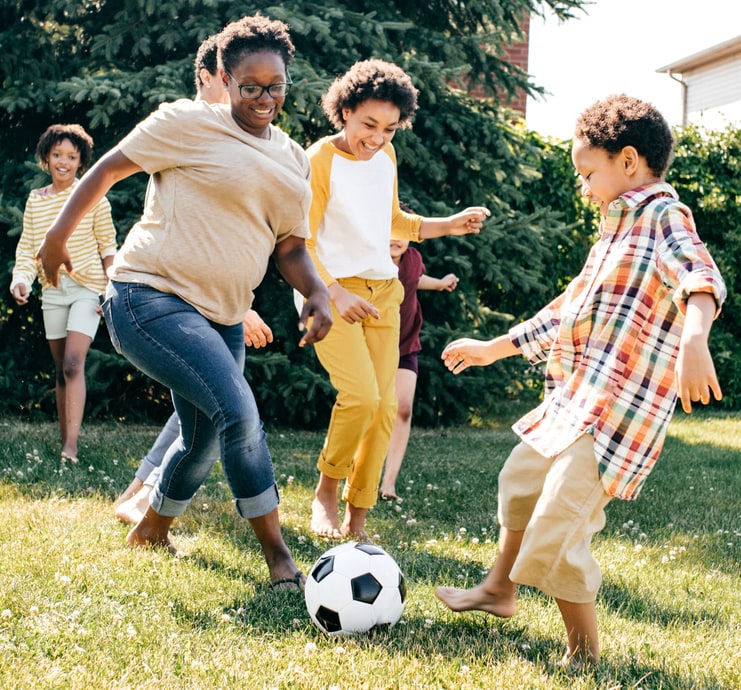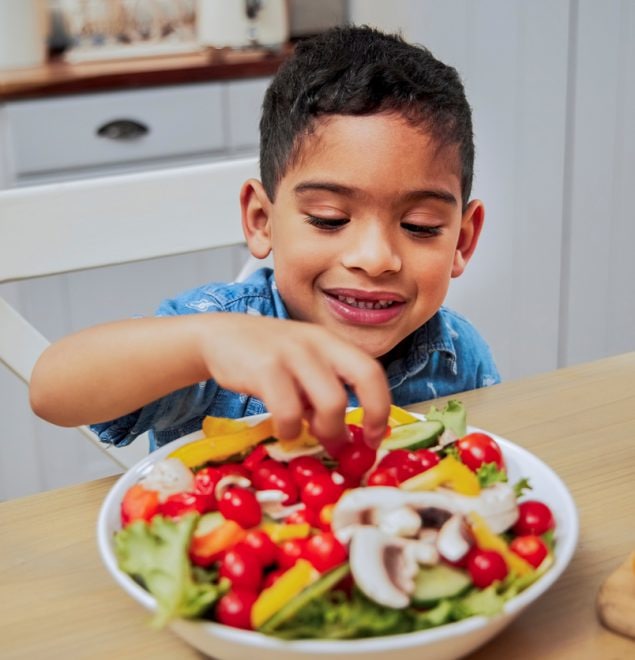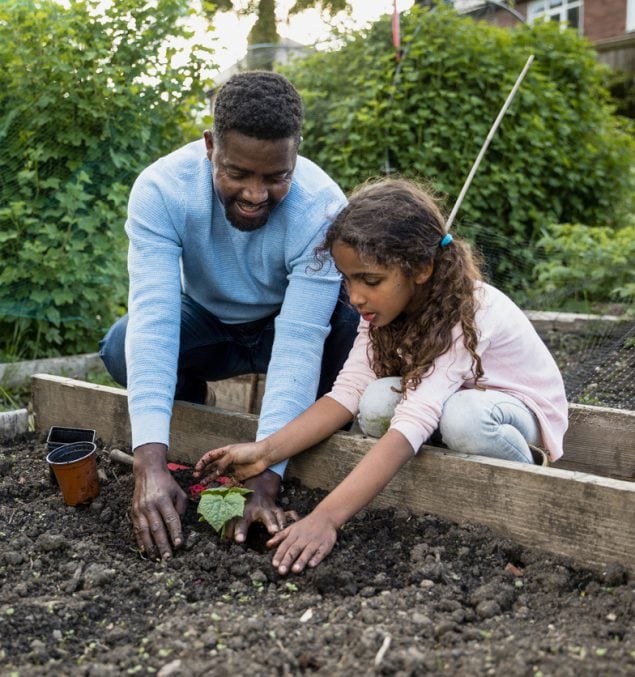Learn ways you can support your child’s physical and emotional well-being.
Helping our children have healthy bodies and minds is more important than ever. Parents can support their children’s physical and emotional well-being by giving them opportunities to:
- Handle stress well through physical activity and healthy thinking.
- Relate to others by encouraging social interactions and emotional awareness.
- Make healthy choices about how they eat and play.
You can help your kids prepare mentally, physically, and emotionally for the upcoming school year with healthy and fun summer activities.

Playing outdoor games can keep kids physically active.
Physical Activity
Here are activities your child can do indoors and outdoors:
Ideas for Indoor Activities
- Play games that encourage movement. Are your kids stuck in the house on a rainy day? Check out this game library for ideas to help your kids be physically active when they can’t go outside.
- Watch this video for tips to help your kids get moving and stay active indoors.
- Learn a fun dance move or try a new sport.Trying something new can be fun and rewarding.
- Try aerobic, muscle- and bone-strengthening physical activities. Get examples of these activities that include things your child can enjoy doing indoors and around the house.
Ideas for Outdoor Activities
- Plan exercise around your day. Are your kids going to a camp or activity? Use these ideas to plan and add physical activity before, during, and after those events.
- Discover a fun new activity. Try a new activity or learn a new sport with friends. It can be rewarding and fun!
- Explore nature. Use this Family Nature Club Toolkit to help you plan and share outdoor experiences with friends and families who are also yearning for “more green, less screen.”
Goals:
- Get 60 minutes of physical activity each day
- Get outside when possible
- Try new activities
Safety Considerations
Why Physical Activity Is Important:

Adding a fruit and more vegetables can make salads fun to eat.
Nutrition
Here are some ways to learn more about nutrition and help your family try something new:
Learn More About Nutrition
- Use an app for kids that teaches smart food choices. Download the Dining Decisions mobile appon your phone or tablet to help your kids learn about healthy food choices at home or on the go.
- Find games and activities that promote healthy eating. Find a list of interactive websites and activities for kids that are appropriate for different grade levels.
- Provide healthy foods for your family. Learn about GO, SLOW, and WHOA foods to help you plan your grocery shopping trips. Learn healthy eating tips that will help you add healthy fats, cut sodium, bump up fiber, and get a variety of colors on your plate.
- Learn the benefits of drinking water. Find out why it’s important to choose water and healthier drinks.
Try Something New
- Make a new recipe with your child. Choose a kid-friendly recipe that includes a fruit or veggie your child likes. It’s a great way to bond and encourage cooking habits in the home.
- Try a new fruit or vegetable. Use a list of fruits and vegetables and ask your child to pick some to try. Give your child a chance to “rate” the fruit or vegetable using this Kids Food Critic activity to make exploring new foods more exciting.
- Try new healthy snacks. Use this list of healthy snacks to come up with your own list of snacks for your family to try.
- Choose water over sugary drinks. Discover tricks to rethink your drink.
- Provide a variety of healthy foods for breakfast. A healthy breakfast can include foods that aren’t traditional breakfast foods. Here are some quick and easy tips for making healthy breakfasts for kids.
Goals:
- Include fruits and vegetables with each meal
- Eat less sugar
- Practice making healthy food choices as a family
Safety Considerations
How to be safe when preparing and eating food:
Why Healthy Eating Is Important

Gardening together can foster teamwork and improve mood.
Emotional Well-being
Here are things your child can do to improve their emotional well-being, whether they’re spending time alone or with others:
Alone
- Give your child a new responsibility that fits their age. Learn steps you can take to help your child recognize and manage emotions, set and achieve positive goals, and make responsible decisions.
- Nurture your child’s creativity and self-esteem through arts and crafts. See this guide for 15 art lessons you can use in the home to support your child socially and emotionally.
- Grow plants in a container. Use this activity to teach your child how to set a goal and achieve it. Find tips for making a terrarium mini-garden.
- Help your child get enough sleep. Check out this infographic on the right amount of sleep for children, the importance of sleep, and tips for good sleep.
- Reduce time watching a screen. Learn how parents can help their child get less screen time and more “lean” time doing physical activity.
- Teach your child ways to think positively, like being grateful, to help reduce stress and feel better. Discover ways to practice gratitude.
With Others
- Show kids that they belong. Learning to hear your own voice and honor the voice of others is a great way to build positive friendships. Check out these videos by kids that show how this happens at school and home.
- Learn how others move and think. Dancing to music from other countries or in other languages can strengthen your ability to empathize with people from diverse backgrounds and cultures. Try dancing to hits from around the world or other multicultural music options.
- Help out others and grow relationships. Try planting a garden or volunteering at a community garden as a family. This activity can help foster teamwork and strengthen relationships.
- Raise stronger kids through positive parenting. Kids are empowered when they feel understood and trusted. Try using these positive parenting tips to help strengthen their self-confidence and resilience.
- Get active in your community. Camps and other out of school time programs provide opportunities for children to try new activities, develop relationship and social skills, and be physically active. Visit your county’s parks and recreation office or website for information on free summer sessions near you.
Goals:
- Get plenty of sleep each day
- Practice positive thinking
- Include others in activities
- Reduce screen time
Safety Considerations
Why Emotional Well-Being and Mental Health Are Important
References
- Jones SE, Ethier KA, Hertz M, et al. Mental health, suicidality, and connectedness among high school students during the COVID-19 pandemic – Adolescent Behaviors and Experiences Survey, United States, January-June 2021. MMWR Suppl. 2022;71(3):16-21. doi:10.15585/mmwr.su7103a3





